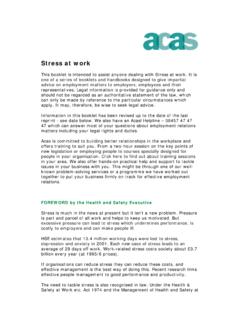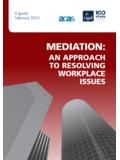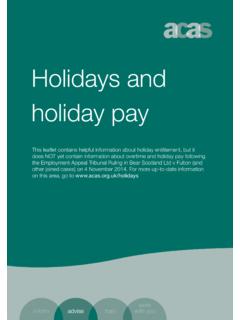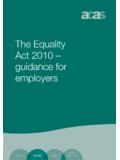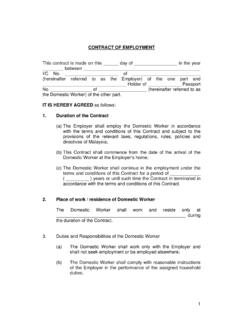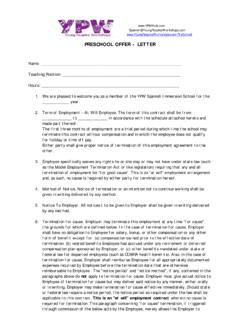Transcription of 43455 2902905 Contract of Employment - Home | Acas
1 Varying a Contract of Employment We inform, advise, train and work with you Every year Acas helps employers and employees from thousands of workplaces. That means we keep right up-to-date with today's Employment relations issues such as discipline and grievance handling, preventing discrimination and communicating effectively in workplaces. Make the most of our practical experience for your organisation find out what we can do for you. We inform We answer your questions, give you the facts you need and talk through your options. You can then make informed decisions. Contact us to keep on top of what Employment rights legislation means in practice before it gets on top of you. Call our helpline 0300 123 1100 for free confidential advice (open 8am-6pm, Monday to Friday) or visit our website We advise and guide We give you practical know-how on setting up and keeping good relations in your organisation. Download one of our helpful publications from our website or call our Customer Services Team on 0300 123 1150 and ask to be put you in touch with your local Acas adviser.
2 We train From a two-hour session on the key points of new legislation or employing people to courses specially designed for people in your organisation, we offer training to suit you. Go to to find out more. We work with you We offer hands-on practical help and support to tackle issues in your business with you. This might be through one of our well-known problem-solving services. Or a programme we have worked out together to put your business firmly on track for effective Employment relations. You will meet your Acas adviser and discuss exactly what is needed before giving any go-ahead. Go to for more details. Why not keep up-to-date with Acas news and notifications by signing up for our popular e-newsletter. Visit Changes occur in working relationships for all kinds of reasons but problems can be avoided or resolved through proper discussion between employer and employee. Any agreed changes in the Contract should be recorded in writing.
3 This leaflet is intended to give general guidance about the main legal considerations which may arise when employers or employees wish to change (or amend) the terms of a Contract of Employment between them. It is not an authoritative statement of the law; determining the law is a matter for the tribunals and the courts. Although every effort has been made to ensure that the information contained in the leaflet is accurate, the varying of contractual terms is a complex legal matter and it is advisable to seek independent legal advice. Employers should be cautious if they are intending to vary a Contract of Employment when there has been a change of employer as a result of a business transfer or service provision change. This could be a recent transfer, or it could have been at any point in the past. There are special protections and rules regarding the contractual terms and conditions employees have when they transfer. For more information, see the Acas Guide Handling TUPE Transfers.
4 What is a Contract of Employment ? A Contract is an agreement between two parties and is enforceable by law. A. Contract of Employment is a Contract of service and comes into being when an employee agrees to work for an employer in return for pay. VARYING A Contract Employment 1. What are Contract terms? The terms of the Contract are the rights and obligations which bind the employer and employee to the Contract . The terms of a Contract can be: express (those which are explicitly agreed between the employer and employee, either in writing or orally). implied (those which have not been spelled out but which would be taken by the people involved to form part of the Contract ) or statutory. Express terms may be established by referring to various sources, particularly the written statement of terms and conditions (to which most employees are entitled under the Employment Rights Act 1996), the letter of appointment and written or oral statements made by the employer and accepted by the employee.
5 Express terms may also be incorporated into individual contracts by reference to other documents, such as collective agreements made with the recognised trade union and company handbooks. Implied terms are often: too obvious to mention or because the people involved assumed they would be incorporated at the time the Contract was entered into (eg: that the employee will not steal from the employer or that the employer will provide a safe working environment). necessary to make the Contract workable (eg: that an employee employed as a driver will hold a valid current driving licence). the custom and practice of the business or industry, ie: where a particular custom or practice has been adopted over a period of time. Statutory terms are those implied or imposed by an Act of Parliament or Statutory Instrument, eg: the entitlement to be paid the national minimum wage or given a minimum period of notice. Agreements to Contract out of statutory terms are normally void under the law1.
6 1 Some of the measures in the Working Time Regulations 1998 may be adapted through agreements between workers and employers. For further information, go to or try 2 VARYING A Contract Employment . Why would employers or employees want to vary a Contract ? An employer may wish to vary the terms of the Contract because of changed economic circumstances or due to a reorganisation of the business. Possible areas of change could include pay rates, hours or days worked, duties, supervisory relationships or place of work. An employee may seek to vary the Contract to bring about improvements in pay or working conditions, for instance by requesting additional holidays, or to change the conditions so that they suit him or her better, eg: by requesting a change from full-time to part-time working because of domestic responsibilities. How can contracts be varied? An existing Contract of Employment can be varied only with the agreement of both parties.
7 Changes may be agreed on an individual basis or through a collective agreement (ie: agreement between employer and employee or their representatives (trade unions or workforce representatives)). An employer who is proposing to change an employee's Contract of Employment should fully consult with that employee or his or her representative(s) and explain and discuss the reasons for the change. Employees are far more likely to accept changes if they can understand the reasons behind them and have an opportunity to express their views. Involving employees makes good business sense, as it drives up levels of employee engagement and motivation. Variations to the Contract can be agreed verbally or in writing. It is preferable for any agreed changes to be recorded in writing. Where a variation to the Contract has been agreed and the changes concern particulars which must be included in the written statement of terms and conditions, the employer should give written notification of the change to the employee, within a month of the change taking effect.
8 VARYING A Contract Employment 3. 1. In what circumstances can an existing Contract authorise changes in the employee's working conditions? A Contract may contain express terms which allow an employer to make changes to employees' terms and conditions. The flexibility clauses may be quite specific or they may include a general power to allow the employer to change the Contract terms. WARNING. As case law suggests that tribunals and the courts often place a fairly narrow interpretation on flexibility clauses an employer should seek legal advice if they intend to rely upon the flexibility clause in their employees'. contracts to vary the terms and conditions. How can an individual Contract be varied by a collective agreement? A Contract of Employment is in law an agreement between an employer and an individual employee. Any variations to the Contract need that individual's agreement. However, an employer and employee can agree, either expressly through a clause or reference in the employee's Contract , or through an implied term, that relevant changes in terms and conditions can be negotiated by a trade union(s) on the employee's behalf.
9 This may be the case whether or not the employee is a member of the recognised trade union(s). Varying a Contract : employers' questions What's the first thing I should do? Consult with your employees (or their representatives) about any proposed changes to their Contract with the aim of seeking the employee's agreement. It is best practice for you to seek written consent to the changes from the employee (an e-mail response from your employee would normally be acceptable). You must also provide a written statement detailing the changes to their written statement of terms and conditions within one month of the change taking effect. It is best to renegotiate an existing Contract through consultation and discussion with your employees. The aim of this is to reach a compromise. 4 VARYING A Contract Employment . Is it worth offering incentives? It maybe. Some employers offer incentives to encourage their employees to agree to the change(s).
10 You might offer to buy out a term in the Contract to allow them to introduce a different contractual term. Incentives do not have to be financially costly to a company, for example, a company wishing to alter shift patterns may be able to offer extra paid or unpaid leave in exchange. For more information contact the Acas Helpline on 0300 123 1100 (open Monday to Friday 8am-8pm and Saturday 9am-1pm) or take legal advice. Can I impose a Contract unilaterally? If you impose a new Contract unilaterally you will be in breach of Good practice tips: Contract and your employees may well: 4 keep talking and consult with make legal claims against the employees this will help company for constructive dismissal if maintain levels of productivity the breach is fundamental and and engagement significant 4 follow your internal policies . claim damages for breach of Contract employees should raise formal at a civil court grievances with their employers claim at an Employment tribunal for if they are not happy with a unlawful deduction from wages if the variation in their Contract change affects their pay.


